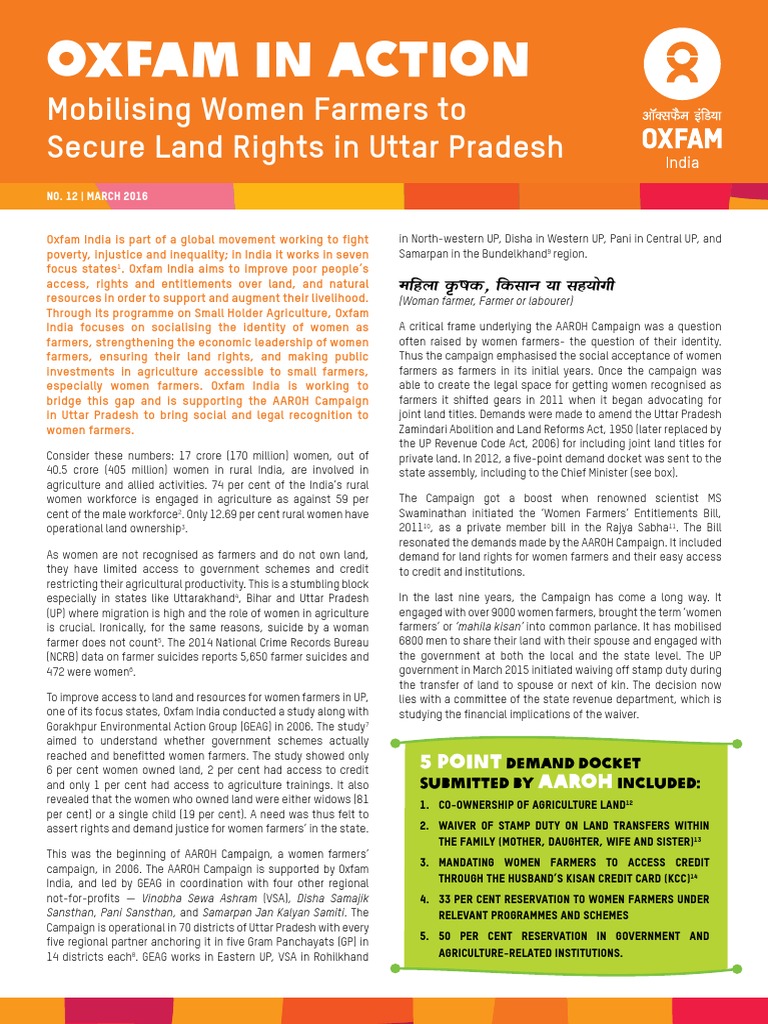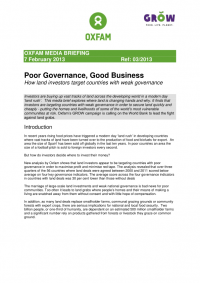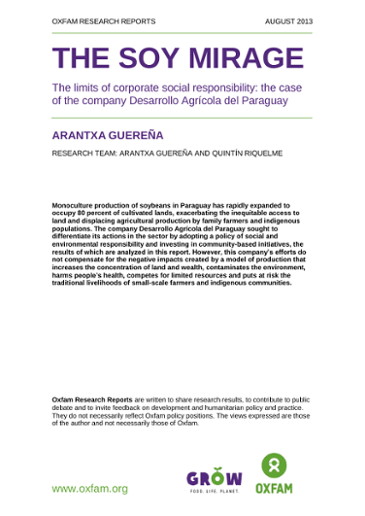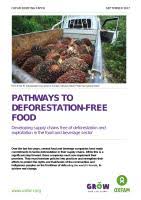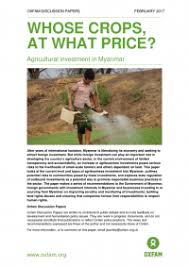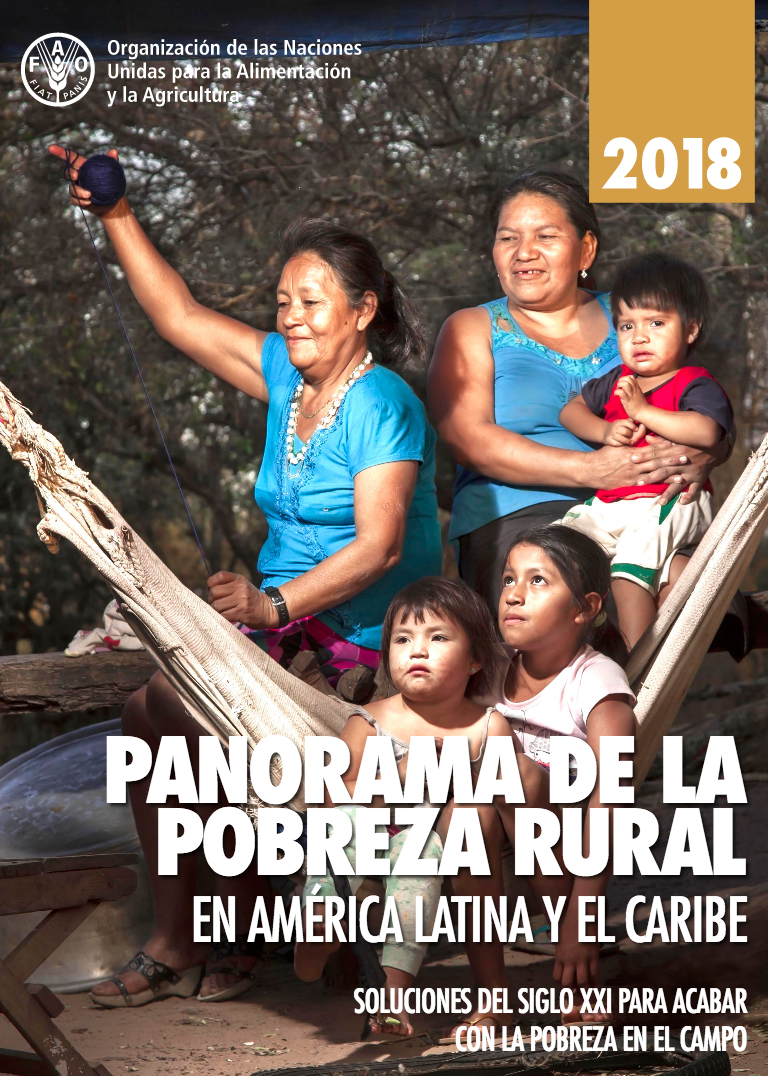Mobilising Women Farmers to Secure Land Rights in Uttar Pradesh
Oxfam India is part of a global movement working to fight poverty, injustice and inequality; in India it works in seven focus state. Oxfam India aims to improve poor people’s access, rights and entitlements over land and natural resources in order to support and augment their livelihoods. Through its programme on smallholder agriculture, Oxfam India focuses on socialising the identity of women as farmers, strengthening the economic leadership of women farmers, ensuring their land rights and making public investments in agriculture accessible to small farmers, especially women farmers.
Poor Governance, Good Business: How land investors target countries with weak governance
Investors are buying up vast tracks of land across the developing world in a modern day ‘land rush’. New analysis by Oxfam explores where land is changing hands and why. It finds that investors appear to be targeting countries with weak governance in order to secure land quickly and cheaply – putting the homes and livelihoods of some of the world’s most vulnerable communities at risk. Oxfam’s GROW campaign is calling on the World Bank to lead the fight against land grabs.
The Soy Mirage: The limits of corporate social responsibility – the case of the company Desarrollo Agrícola del Paraguay
Soybean production in Paraguay now takes up 80 per cent of cultivated land, displacing agricultural production by family farmers and indigenous populations and deepening inequality in access to land.
Pathways to Deforestation-Free Food: Developing supply chains free of deforestation and exploitation in the food and beverage sector
Hidden in the food we buy every day, from chocolate to ice cream, are commodities like palm oil and soy that are driving deforestation across the world. From Indonesia to the Peruvian Amazon, vast areas of carbon-rich forest are being cleared to produce these agricultural commodities, contributing to climate change and social conflict.
Whose Crops, At What Price? Agricultural investment in Myanmar
After years of international isolation, Myanmar is liberalizing its economy and seeking to attract foreign investment. But while foreign investment can play an important role in developing the country’s agriculture sector, in the current environment of limited transparency and accountability, an increase in agribusiness investments poses serious risks to the livelihoods of small-scale farmers and others dependent on land.
Panorama de la Pobreza Rural en América Latina y el Caribe 2018
El Panorama de la Pobreza Rural en América Latina y el Caribe 2018 de la Organización de las Naciones Unidas para la Alimentación y la Agricultura (FAO) informa sobre los importantes desafíos que mantiene la región con el desarrollo de sus territorios rurales para lograr las metas de los Objetivos de Desarrollo Sostenible al 2030, particularmente el ODS 1 de poner fin a la pobreza en todas sus formas en todo el mundo.
A user guide to Mali Africa research in sustainable intensification for the next generation (Africa RISING) baseline evaluation survey data
The Mali Africa Research in Sustainable Intensification for the Next Generation (Africa RISING) Baseline Evaluation Survey (MARBES) survey was implemented during May-July 2014 as part of IFPRI’s Monitoring and Evaluation (M&E) of Africa RISING. The Africa RISING program aims to create-through action research and development partnerships-opportunities for smallholder farmers in Africa south of the Sahara to sustainably intensify their farming systems and to improve their food, nutrition, and income security.
A user guide to Tanzania Africa research in sustainable intensification for the next generation (Africa RISING) baseline evaluation survey data
The Tanzania Africa Research in Sustainable Intensification for the Next Generation (Africa RISING) Baseline Evaluation Survey (TARBES) was implemented during February-April 2014 as part of the International Food Policy Research Institute’s Monitoring and Evaluation (M&E) of Africa RISING. The Africa RISING program aims to create—through action research and development partnerships—opportunities for smallholder farmers in Africa south of the Sahara to sustainably intensify their farming systems and to improve their food, nutrition, and income security.
Sustainable agricultural intensification in forest frontier areas
"The Lore Lindu region in Indonesia—as in many forest frontier areas in Southeast Asia—has experienced rapid deforestation due to agricultural expansion in the uplands, at the forest margins. This has resulted in aggravated problems of erosion and water availability, threatening agricultural productivity growth. At the same time, technical progress is promoting agricultural intensification in the lowlands. In this article, we examine how improved technologies for paddy rice cultivation in the lowlands have affected agricultural expansion and deforestation in the uplands.
Regional developments [In 2016 Global Food Policy Report]
In addition to global events and food policy changes, 2015 also saw important developments with potentially wide repercussions in individual countries and regions. This chapter offers perspectives on major food policy developments across the major regions: Africa, the Middle East and North Africa, Central Asia, South Asia, East Asia, and Latin America and the Caribbean.
The sustainable land management program in the Ethiopian highlands: An evaluation of its impact on crop production
Agricultural productivity in the highlands of Ethiopia is threatened by severe land degradation, resulting in significant reductions in agricultural GDP. In order to mitigate ongoing erosion and soil nutrient loss in the productive agricultural highlands of the country, the government of Ethiopia initiated a Sustainable Land Management Program (SLMP) targeting 209 woredas (districts) in six regions of the country. This study evaluates the impact of SLMP on the value of agricultural production in select woredas by using a panel survey from 2010 to 2014.


